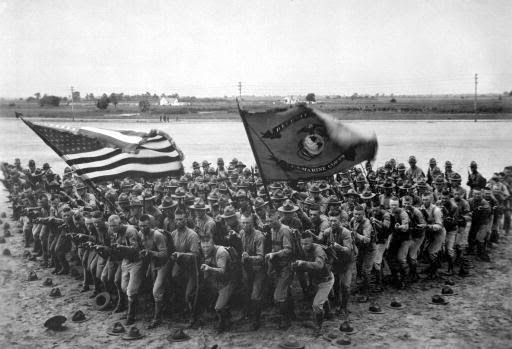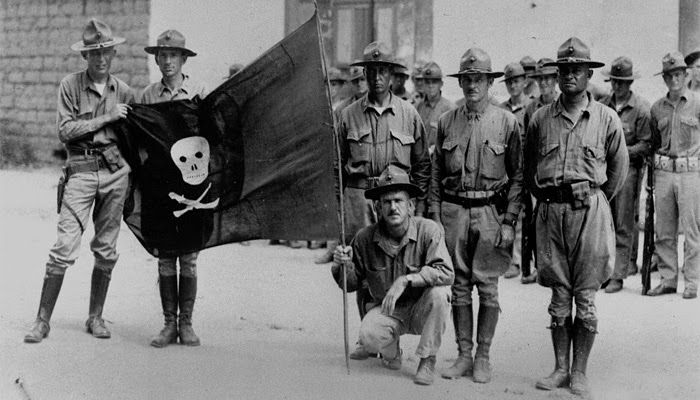When November and the election rolled around, FDR won by a wide margin, akin to Hoover's victory in 1928. However, his reputation was already in shambles. A self-feeding media frenzy kept up an unrelenting barrage of accusations about his ties to Russia. Most frequent were questions about his alleged meetings with Soviet Ambassador to the US Boris Skvirsky, and Skvirsky's visit to the Philadelphia Veteran's Commune.
"It was a mere polite introduction to Mr. Skvirsky at a luncheon engagement. I also met several other nation's ambassadors and they were all polite, kind men of distinction, and we talked over some finger sandwiches like gentlemen. Nothing more!" Roosevelt addressed the press on November 12th.
"Mr. President-Elect," started the ABC reporter, "Is it true that a Russian oil company donated large sums to your campaign?"
"No! AMPET stands for American Petroleum, what part of that do you not understand? Their Vice Chairman of the Board might be a Jewish immigrant from Russia originally, but that has no impact on anything at all!"
"Is it true that the liberal wing of the Democrat party seeks total desegregation of whites and blacks in America? Is that what you stand for?" asked NBC.
"That is absurd. We are not about to undermine American Society. We have no interest in such radical changes. What our people of every color want is jobs, jobs, jobs, and food in their pot! And that is what I will give them. I want to fix the economy and all you people do is jabber on about my nonexistent ties with Russia and if you're going to put me before this kind of firing squad at least give me a cigarette first."
"Mr. President, what are your goals with New Jersey?" inquired CBS.
Roosevelt took a sip of much-needed water before answering, "Finally a damn question I can respond to. My goals are to gradually end martial law and call for proper elections to determine a new governor. Our brothers and sisters in New Jersey will eventually go back to jobs, food, and a normal life."
"Mr. President, what have you to say of Mr. Skvirsky's visits to the Philadelphia Veteran Commune, a Commune which, frankly, went strongly for you or the Socialist Reverend in the election?" the ABC reporter shifted the discussion back to the last thing he wanted to talk about.
"Look," Roosevelt pointed a stern finger at the media man, "I have no control nor say over how Mr. Skvirsky spends his time. He is a fully recognized diplomatic official and is entitled to the respect owed him and may travel wherever his papers allow. I know nothing about his trips and I've had about enough cockamamie conspiracy theories running around about them. I don't know if he went to pass out candies in the camp or if they sang the Internationale together. I don't know and frankly am not interested. I've had about enough of this witchhunt pandering to reactionaries among us who have already come to their own conclusions that I absolutely adore Joseph Stalin and wish to implement Marxist policies simply because I want to create public welfare agencies and take us off the gold standard, a standard which got us into the economic depression we are currently stagnating in. It was unhinged capitalism which took us from a thriving country to the depths of the depression."
"So, you're saying
capitalism is to blame? Would, say,
socialism be a better form of government in the current situation?" pressed the ABC man again, his eyes squinting in suspicion under the brim of his fedora.
"No damn it!" Roosevelt stamped his hand on the podium. "We need a regulated free market and we need to inject it with capital and ensure our economy recovers."
"So you want to bail out failing companies for the good of us all? Isn't that by definition redistribution of wealth? Taking from Bob to keep Sally from going under? Marxism, if you will?" Roosevelt could hear the accusing tone in the man's voice.
"No, no, no, it is a New Deal for the American people, rich and poor. I am not tied to Big Industry and I will always be there for the little man. That man need's security, knowing the government won't let businesses and monopolies tank the economy without any guidance from the government whatsoever. Now you can read any Liberty League-leaning rag and you'll read the phrase socialism until your eyes are raw, but what you won't read are my programs to reform banking, agriculture, and grab America by the bootstraps and set our ship on it's proper course again. Now, I have urgent matters to attend to and so I take leave of this ambush. Good day to you all."
THE BATTLE OF PHILADELPHIA
Members of the Philadelphia Commune prepare for the arrival of Federal troops
Roosevelt was a very unhappy man. He was struggling to get anywhere, and he hadn't even been sworn in yet, until March. Congress however, had voted to move the inauguration of future presidents back to January 20, but that wouldn't take effect until 1937. President Curtis was holding the country together in the meantime as best as he could, but FDR worried he wouldn't get anywhere at all with all the communist conspiracy theories. In early January of 1933, however, the situation in Europe became much more alarming. Paul von Hindenburg had finally proclaimed the young firebrand German National Socialist German Worker's Party (NSDAP) leader, Adolf Hitler, as Chancellor of all Germany. And it was in these times where the right was seeing a surge in popularity that the Philadelphia Veteran Commune was about to make headlines again, and the nation would be plunged into civil unrest once again, and the results would not help the left in the nation at all.
On February 3rd, 1933, President Curtis moved Federal troops to Philadelphia in response to growing reports of revolutionary activity at the Commune. Some 15,000 members of the Army and Marines and 1000 policemen from across Pennsylvania arrived and surrounded the camp. Two days before, it was reported that the Communal Committee had developed a plan to overthrow the government of Philadelphia and proclaim a Soviet-style People's Republic. The Federals began ordering for the dispersal of the Commune at 9am. When the veterans and their families refused to budge, Lt. Col. Patton ordered his tank column forward. As the tanks crept closer to the walls of junk and refuse that the leftists had stacked up, the veterans inside started chanting, "Shame! Shame!" Patton again ordered the militias to disperse. He was determined not to repeat MacArthur's mistake, so he tried to give them multiple opportunities to surrender and go home. Each time the tanks crept a bit closer.
At 3pm, Patton announced a final warning over his tank's speaker system:
"The people of America and Pennsylvania wish no ill on you. We respect the service you offered us during the war. Hell, I fought alongside many of you salty bastards. However, due to confirmed reports that your leaders are planning to overthrow the duly-elected local and state government, and in an effort to prevent this state from becoming a second New Jersey, and also again to shut down this unlawful assembly, the United States government and the state government and local law enforcement give you one more chance. If you have not shown an effort in good faith to withdraw from this campsite by 4pm, we will have no choice but to enter your campsite and disperse you with force and arrest your leadership. Once more, disperse by 4pm, or we're coming in."
US Marines rushing across the fields during the Battle of Philadelphia
The men inside the fortifications looked pale. A couple thousand men and their families jumped fence and deserted to Federal lines. But most stayed. When 4pm rolled around and the veterans remained, tear gas was deployed and Patton lowered himself into his tank and closed the hatch. With a jolt, his tank started forward and became the rallying point for all the other armored vehicles. As the M2A2 tank smashed through the main gate, bullets began to fly on both sides and the destruction was unimaginable. As the veterans attempted to stop the tank column to no avail they were being mowed down in droves. Five biplanes flew overhead and dropped grenades on the main barracks buildings, which set off massive explosions of stockpiled ammunition and ordinance, killing at least 100 in the initial blasts. Within 30 minutes the veterans had been totally routed, and Patton had the ringleaders arrested. As some of the vets scurried into Philadelphia proper, the US Cavalry charged down the empty streets in search of runaways.
"I was only 5 at the time, but I remember my mother holding me under the front window and trying to keep my head down. I asked what all the explosions and horses were about. And then I heard the screams. A few hours later, we opened our door and saw five men's bodies in the street, dressed in rags, two in Great War uniforms, and also a horse, laying atop a badly wounded US Cavalryman. We dragged the wounded man into our house and bandaged him up. My mother turned to me and said, 'This is what the Communists bring to our home.' I never will forget ever."
-Jericho Wallace, eyewitness to the Battle of Philadelphia, describing his experience in Marlon Spear's 1974 historical account
Red Blood: The Crushing of the Philadelphia Commune
US Marines present a captured Commune battleflag, Philadelphia, February 3rd, 1933
Towards the end of the day, most of the revolutionaries had been killed, arrested, or chased off. As the Federal troops began tearing the camp apart they made a very interesting discovery. Inside one of the main depots were dozens of crates with Red Cross insignia, all labeled "Goodwill Food Relief." Inside them were hundreds of Soviet-made rifles, handguns, and assorted military goods, mostly hidden under layers of canned vegetables and soup. Before long, newspapers across the country were running stories about the "attempted Communist revolution in Pennsylvania" and how close the state had been to becoming a Soviet Republic. The country, just earlier that year, had been leaning far left. Now, as the smoke cleared over the Commune, far right hysteria hit a zenith nationwide and anyone with ties to the radical left now found themselves being watched like field mice by an owl's nest. Most all of the Liberty League's accusations of FDR being tied to socialism were bogus, but now an attempted Communist insurrection had been put down in the nation's heartland. Truly, the first months of FDR's presidency would be difficult indeed.








